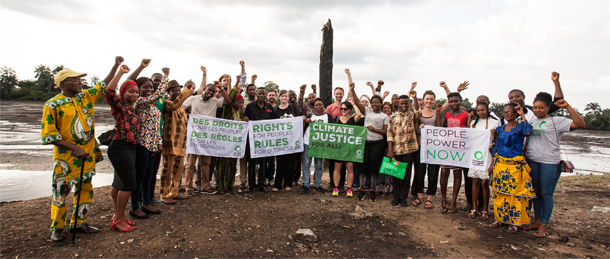April 8th, 2019 News from Milieu Defense (FoE Netherlands)
The Hague – Friends of the Earth Netherlands will deliver a court summons to Shell to legally compel the company to cease its destruction of the climate, on behalf of more than 30,000 people from 70 countries.

A Call for Climate Justice
A 236 page complaint will be delivered to Shell’s International Headquarters in the Hague this afternoon by Friends of the Earth Netherlands, ActionAid NL, Both ENDS, Fossielvrij NL, Greenpeace NL, Young Friends of the Earth NL, Waddenvereniging and a group of 500 co-plaintiffs.
Shell’s oil and gas reserves in Australia contain some 1,000,000,000 ton of CO2. This court case could substantially impact on Shell’s operations in Australia by requiring them to limit carbon emissions from their polluting business in line with global carbon targets, leading to stranded assets.
Ian Dunlop, former executive at Royal Dutch Shell and chair of the Australian Coal Association (1987-88) has joined the case as an honorary co-plaintiff said ?“I strongly support the Friends of the Earth Netherlands/ Milieudefensie legal summons against Shell. After three decades of inaction, climate change has entered the end-game where it is now an immediate existential threat to humanity. There is no further place for the predatory delay which fossil fuel companies like Shell remain guilty of today. Fossil fuel expansion must stop, and existing carbon emissions rapidly reduced.”
In the court summons, Friends of the Earth Netherlands outlines why it is bringing this groundbreaking climate litigation case against Shell, highlighting the company’s early knowledge of climate change [1] and its own role in causing it. Despite acknowledging that the fossil fuel industry has a responsibility to act on climate change, and claiming to “strongly support” the Paris Agreement, Shell continues to lobby against climate policy and to invest billions in further oil and gas extraction. This is incompatible with global climate goals.
The 2018 Intergovernmental Panel on Climate Change report [2], a key piece of evidence in this case, underlines the importance of limiting global warming to 1.5 degrees for the protection of ecosystems and human lives, and outlines the devastating and potentially irreversible impacts of any “extra bit of warming”.
The court summons proves that Shell’s current climate ambitions do not guarantee any emissions reductions, but would in fact contribute to a huge overshoot of 1.5 degrees of global warming. The plaintiffs argue that Shell is violating its duty of care and threatening human rights by knowingly undermining the world’s chances to stay below 1.5C.
In addition, the plaintiffs argue that Shell is violating Articles 2 and 8 of the European Convention on Human Rights [3]: the right to life and the right to family life. In the historic Urgenda case against the Dutch state[4], the Dutch Appeals court created a precedent by ruling that a failure to achieve climate goals leads to human rights violations. The court ordered the Dutch state to cut its greenhouse gas emissions by at least 25% by the end of 2020.
Roger Cox, who initially represented Urgenda, is now leading Friends of the Earth’s case against Shell. Roger said, “If successful, the uniqueness of the case would be that Shell, as one of the largest multinational corporations in the world would be legally obligated to change its business operations. We also expect that this would have an effect on other fossil fuel companies, raising the pressure on them to change.”
If successful the court case would rule that Shell must reduce its CO2 emissions by 45% by 2030 compared to 2010 levels and to zero by 2050, in line with Climate Paris Accord. This would have major implications, requiring Shell to move away from fossil fuels.
Friends of the Earth International Climate Justice and Energy campaigner Sara Shaw said, “In leaked company documents [5] from the 1990s Shell predicted that environmental organizations would start suing the company for causing climate change if it did not listen to the warnings of its own scientists. Well, that day has come. This rising tide of climate litigation will finally call climate wrecking corporations like Shell to account and stop them in their tracks.”
Several lawsuits holding polluting companies to account for contributing to climate change exist globally. In 2016 a Peruvian farmer filed a lawsuit suing German coal company RWE for its contribution to glacier melt. In 2017 several American cities and states started climate cases against Shell, BP, ExxonMobil and Chevron.
References
- Legal Summons in full, unofficial translation from Dutch original
- Interview with Roger Cox, leading lawyer in Friends of the Earth’s case against Shell
[1] A Crack in the Shell: New Documents Expose a Hidden Climate History (April 2018)
[2] 2018 Intergovernmental Panel on Climate Change report — https://www.ipcc.ch/sr15/
and FoE summary https://www.foei.org/features/ipcc-report-climate-catastrophe
[3] European convention on Human Rights
[4] The Urgenda climate litigation case against the Dutch government
[5] 1988 Shell Confidential Report “The Greenhouse Effect”
